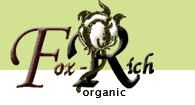
|
 |
|
Organic
Cotton
Fox-Rich is a Certified Organic Cotton Fabric
Producer and a Member of the Organic Trade Association
|
 What
is Organic Cotton? What
is Organic Cotton?
Organic agriculture is an ecological
production management system that promotes and enhances biodiversity,
biological cycles and soil biological activity. It is based
on minimal use of off-farm inputs and on management practices
that restore, maintain and enhance ecological harmony. The
primary goal of organic agriculture is to optimize the health
and productivity of interdependent communities of soil life,
plants, animals and people.
|
 What
does "Certified Organic" mean? What
does "Certified Organic" mean?
"Certified
Organic" means the item has been grown according to strict
uniform standards that are verified by independent state or
private organizations. Certification includes inspections
of farm fields and processing facilities, detailed record
keeping, and periodic testing of soil and water to ensure
that growers and handlers are meeting the standards which
have been set.
|
 How
will purchasing organic products How
will purchasing organic products
help keep our water clean?
Conventional agricultural methods
can cause water contamination. Beginning in May 1995, a network
of environmental organizations, including the Environmental
Working Group, began testing tap water for herbicides in cities
across the United States’ Corn Belt, and in Louisiana
and Maryland. The results revealed widespread contamination
of tap water with many different pesticides at levels that
present serious health risks. In some cities, herbicides in
tap water exceed federal lifetime health standards for weeks
or months at a time. The organic farmer’s elimination
of polluting chemicals and nitrogen leaching, in combination
with soil building, works to prevent contamination, and protects
and conserves water resources.
|
 How
Else Does Organic Protect Our Environment? How
Else Does Organic Protect Our Environment?
Organic agriculture protects
the health of people and the planet by reducing the overall
exposure to toxic chemicals from synthetic pesticides that
can end up in the ground, air, water and food supply, and
that are associated with health consequences, from asthma
to cancer. Because organic agriculture doesn’t use toxic
and persistent pesticides, choosing organic products is an
easy way to help protect yourself.
|
 Will
the Organic Market Continue to Grow, or is it Just a Fad? Will
the Organic Market Continue to Grow, or is it Just a Fad?
The U.S. organic market is projected
to reach a value of $30.7 billion by 2007, with a five-year
compound annual growth rate of 21.4 percent between 2002 and
2007, compared to a 21.2 percent rate between 1997 and 2002.
—Datamonitor analysis, Datamonitor |
|
|